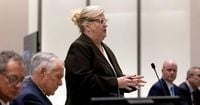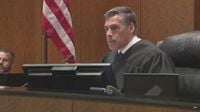On a quiet Monday morning in Provo, Utah, a courtroom filled with tension as attorneys for Tyler Robinson, the 22-year-old charged with the killing of conservative commentator Charlie Kirk, requested more time to review what both sides described as a “voluminous” trove of evidence. The hearing, brief but charged with significance, marked Robinson’s second appearance before Judge Tony Graf, who set the next hearing for October 30, 2025, leaving the community and the nation waiting for the next chapter in a case that has already sent shockwaves far beyond Utah’s borders.
Robinson, who is facing seven counts including aggravated murder, did not appear in person. Instead, at the request of his legal team, he listened in from jail via audio, his camera turned off and his voice absent from the proceedings. According to NPR, his attorney Kathryn Nester—a seasoned defense lawyer with a reputation for handling high-profile murder cases and death penalty defenses—stood in the courtroom, flanked by two California lawyers also experienced in capital cases. Nester made it clear to the court that her team did not intend to waive Robinson’s right to a preliminary hearing, at least not yet. "Until we can kind of get our heads around exactly what we're dealing with and how much we need to process, it's going to be difficult for us to give you a reasonable expectation of when we will be ready to do the prelims," Nester told the judge, as reported by NPR.
The prosecution, led by Utah County Attorney Jeff Gray, echoed the defense’s assessment of the evidence. "There is a substantial amount of discovery in this case, Your Honor. It's voluminous, to say the least, and we're working on a process where we can exchange information as quickly as possible," prosecutor Chad Grunander stated in court, according to NPR. The evidence includes text messages, DNA samples, police interviews with Robinson’s family, and a wealth of photos and videos submitted by bystanders from the day of the shooting.
The events in question unfolded on September 10, 2025, near Utah Valley University in Orem. Students at the campus are still reeling from the trauma of the shooting and the subsequent manhunt that lasted over a day. Authorities eventually apprehended Robinson after he turned himself in at his hometown sheriff’s office in southwest Utah—more than a three-hour drive from the crime scene—accompanied by his parents. According to CNBC News and the Associated Press, prosecutors have since revealed compelling evidence tying Robinson to the killing, including a note he left for his romantic partner. The note reportedly read that he had the opportunity to kill Kirk, “and I’m going to take it.” In a text to his partner, Robinson wrote, “I had enough of his hatred,” according to statements made by County Attorney Gray and reported by multiple outlets.
Charlie Kirk, the victim at the center of this case, was no stranger to controversy or the national spotlight. As a close ally of former President Donald Trump, Kirk dedicated his career to steering young voters toward conservatism, primarily through his organization Turning Point USA, as well as his podcasts and frequent campus events. His assassination has had a ripple effect across the country, galvanizing many on the political right. Trump himself weighed in, calling Kirk a “martyr” for freedom and vowing a crackdown on what he described as the “radical left.” As reported by KWTX and East Idaho News, prominent Republicans have pledged to continue Kirk’s mission of pushing American politics further to the right, even as they mourn his loss.
The fallout from Kirk’s death has not been contained to the political sphere. According to CNBC News and the Associated Press, workers across the United States—including teachers, public and private employees, and media personalities—have faced disciplinary action or termination for speaking out about Kirk. Perhaps most notably, late-night host Jimmy Kimmel saw his show briefly suspended by ABC, only to be reinstated later. The chilling effect has prompted debate about free speech and workplace boundaries, with some arguing that such consequences are necessary to maintain civility and others warning of overreach and censorship.
Kirk’s influence extended far beyond the Republican Party’s core. Through Turning Point USA, he brought young, evangelical Christians into the political fold, leveraging podcasts, social media, and campus appearances to rally a new generation of conservative activists. In the wake of his assassination, his absence looms large over events he had planned to headline. Stepping into the void, Utah Governor Spencer Cox and Senator Mike Lee are scheduled to appear at Utah State University on October 1, 2025, in what many see as both a tribute to Kirk and a statement of defiance against political violence. As reported by multiple sources, these events are expected to draw significant attention from both supporters and critics, underscoring the deep divisions Kirk’s legacy continues to evoke.
Meanwhile, the legal process grinds forward. Judge Tony Graf, who has been on the bench for less than two months, concluded Monday’s hearing with a pointed reminder of the court’s commitment to fairness. He issued an order barring both sides from making public statements that could prejudice the jury pool and assured all present that Robinson’s constitutional rights would be protected throughout the proceedings. As NPR reported, Graf closed with a speech about justice, vowing not to “put his fingers on the scale” as the case unfolds.
The specter of the death penalty looms over the proceedings, with prosecutors making clear their intent to seek the harshest punishment should Robinson be convicted. For now, though, the focus remains on the mountain of evidence that must be sifted through—a process that could take months, given the scale and complexity of the case. Both the defense and prosecution declined to comment to reporters after the hearing, citing the judge’s order and the ongoing nature of the investigation.
As the next hearing approaches, the community in Orem and across Utah remains on edge, grappling with the aftermath of a crime that has upended lives, ignited political passions, and raised difficult questions about justice, free speech, and the price of public advocacy. Students at Utah Valley University continue to process the trauma, while the national conversation about political violence and its consequences shows no sign of abating. With prominent Republicans set to take the stage in Kirk’s stead and the legal battle just beginning, all eyes will remain on Provo in the weeks to come.
For now, one thing is certain: the case of Tyler Robinson and the killing of Charlie Kirk is far from over, and its reverberations will be felt for a long time yet.



